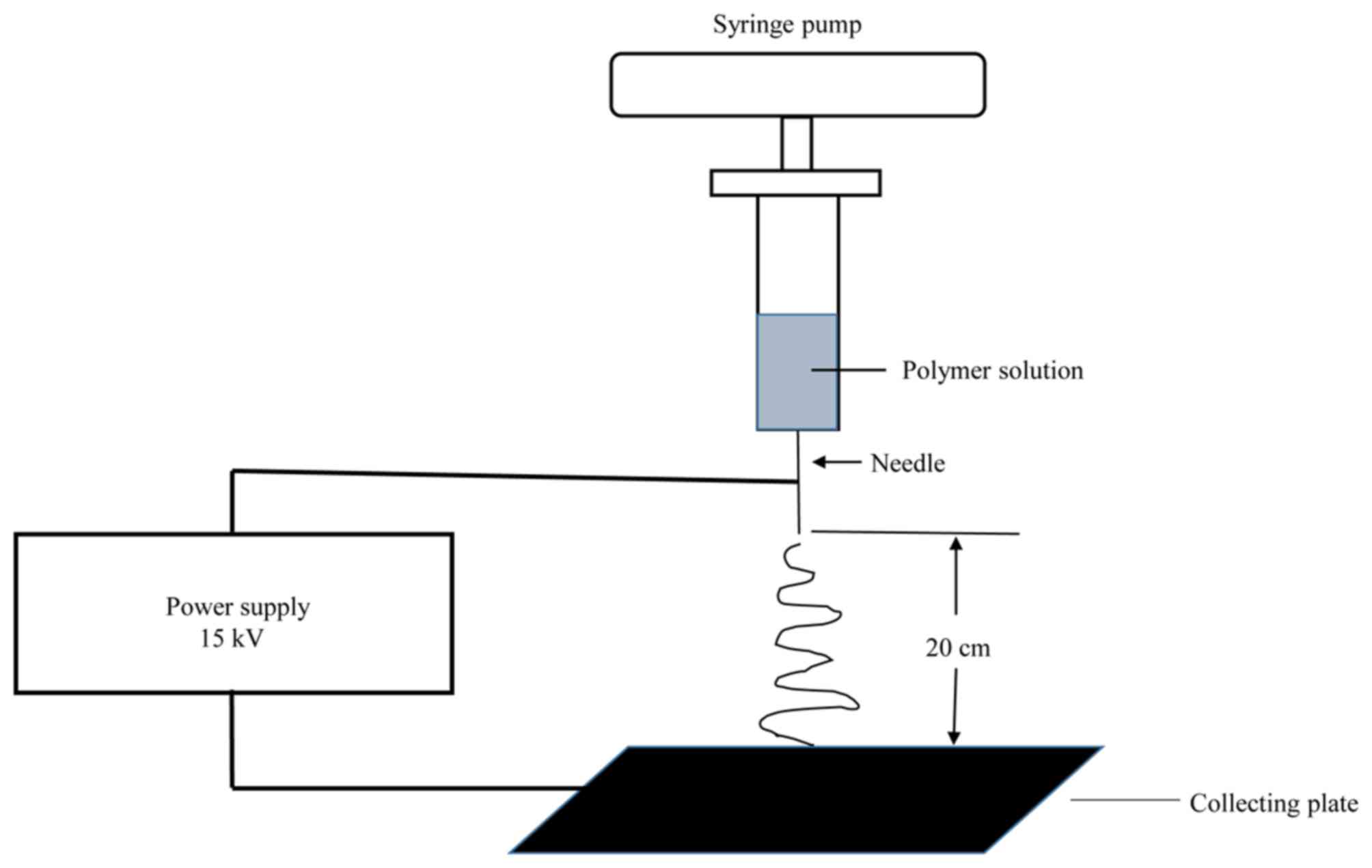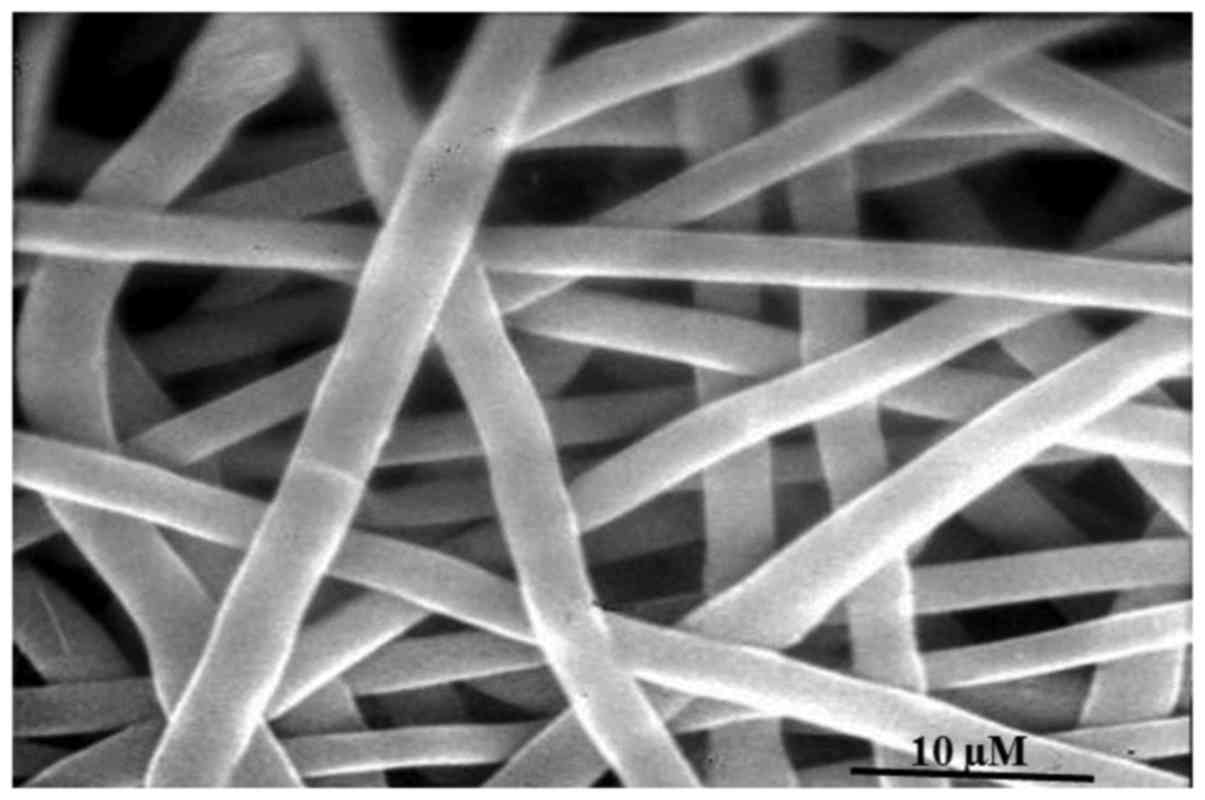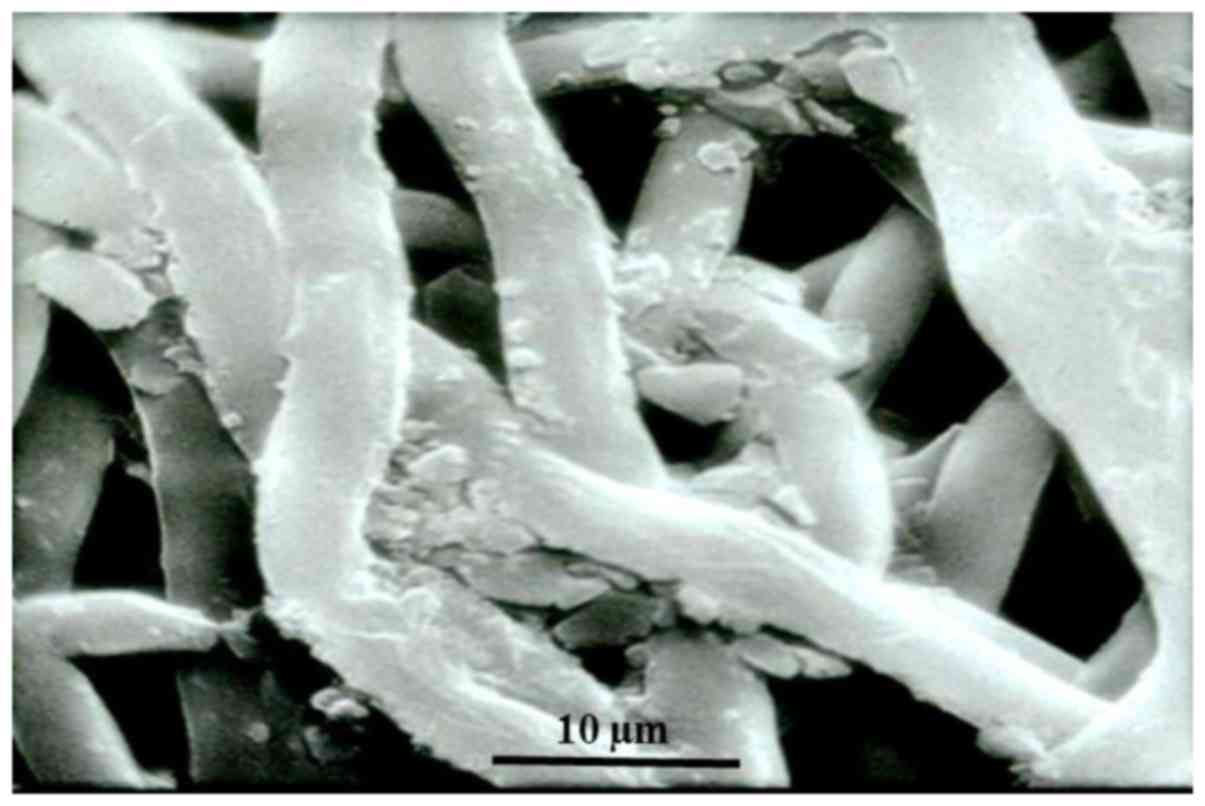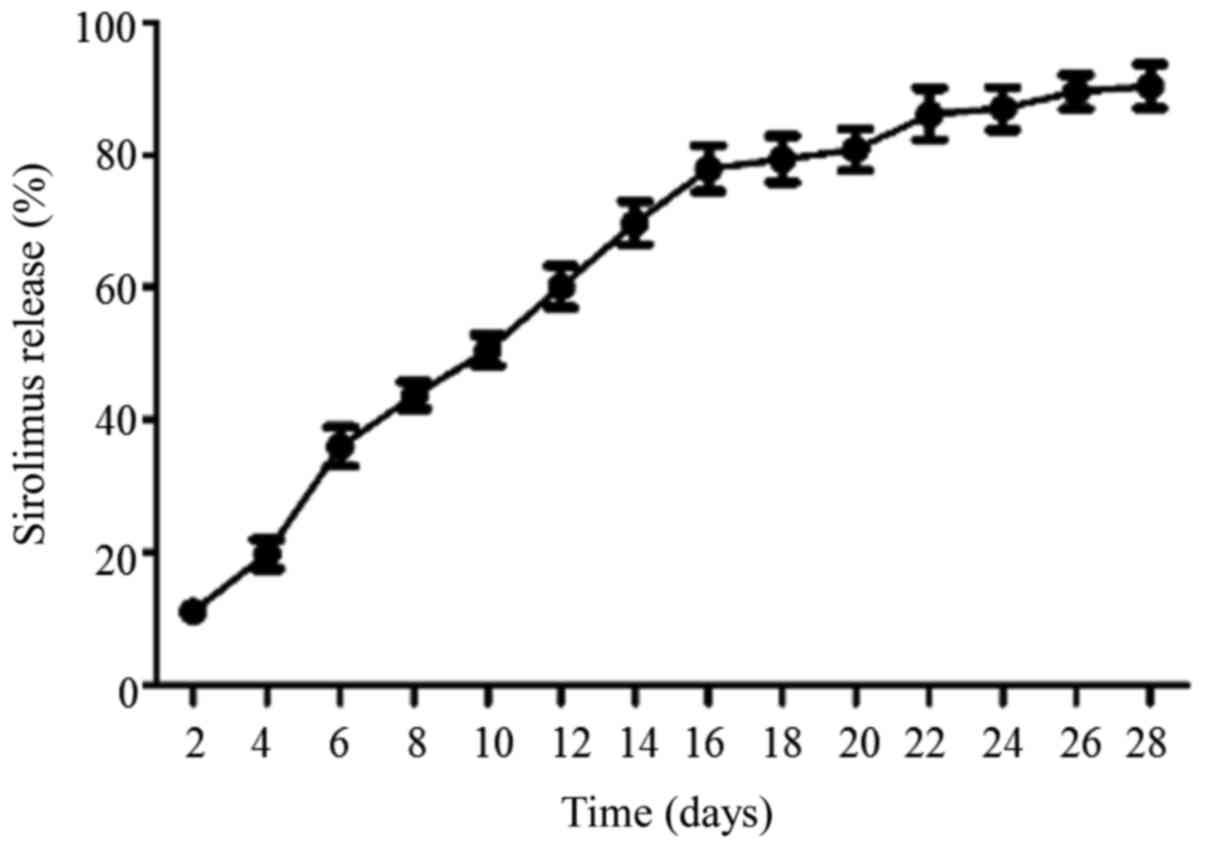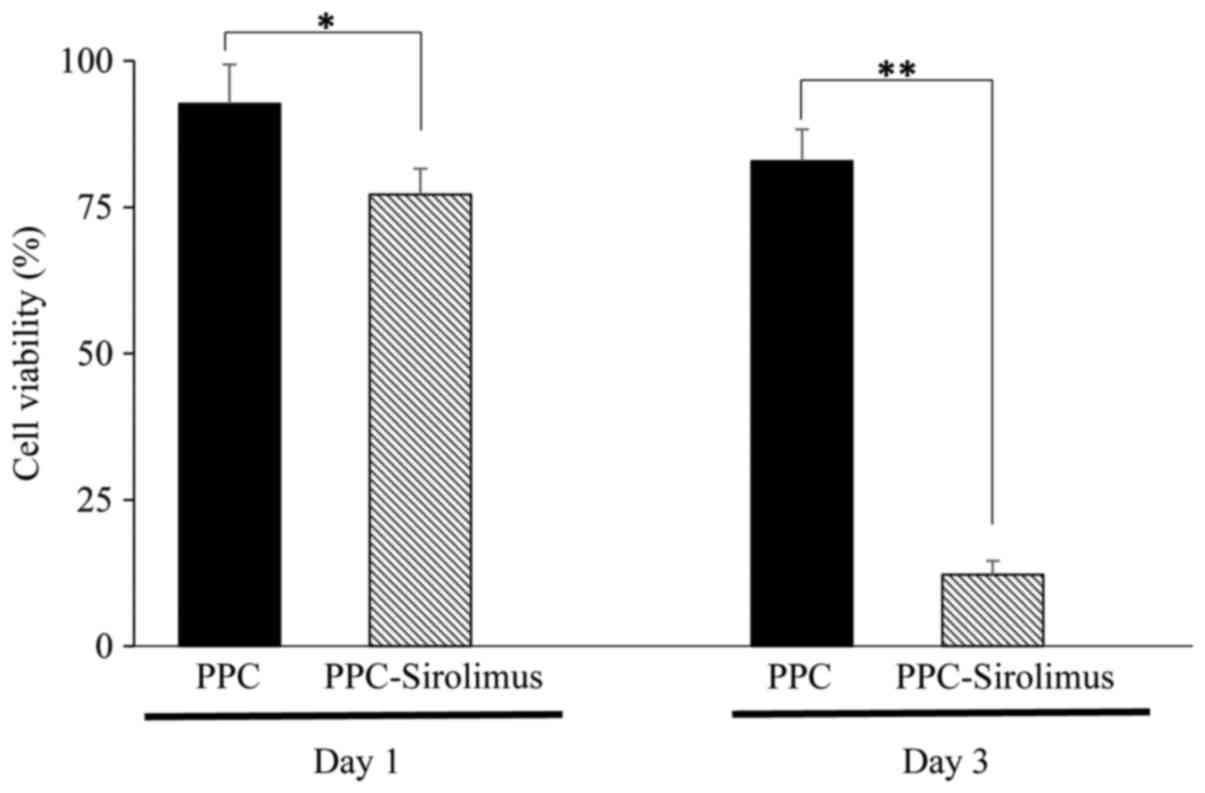|
1
|
Lendlein A: Polymers in biomedicine.
Macromol Biosci. 10:993–997. 2010. View Article : Google Scholar
|
|
2
|
Chattopadhyay S and Raines RT: Review
collagen-based biomaterials for wound healing. Biopolymers.
101:821–833. 2014. View Article : Google Scholar :
|
|
3
|
Williams CK: Synthesis of functionalized
biodegradable polyesters. Chem Soc Rev. 36:1573–1580. 2007.
View Article : Google Scholar
|
|
4
|
Gunatillake P, Mayadunne R and Adhikari R:
Recent developments in biodegradable synthetic polymers. Biotechnol
Annu Rev. 12:301–347. 2006. View Article : Google Scholar
|
|
5
|
Fambri L, Pegoretti A, Fenner R, Incardona
SD and Migliaresi C: Biodegradable fibres of poly(L-lactic acid)
produced by melt spinning. Polymer. 38:79–85. 1997. View Article : Google Scholar
|
|
6
|
Peyton SR, Raub CB, Keschrumrus VP and
Putnam AJ: The use of poly(ethylene glycol) hydrogels to
investigate the impact of ECM chemistry and mechanics on smooth
muscle cells. Biomaterials. 27:4881–4893. 2006. View Article : Google Scholar
|
|
7
|
Kapoor DN, Bhatia A, Kaur R, Sharma R,
Kaur G and Dhawan S: PLGA: A unique polymer for drug delivery. Ther
Deliv. 6:41–58. 2015. View Article : Google Scholar
|
|
8
|
Langer RS and Peppas NA: Present and
future applications of biomaterials in controlled drug delivery
systems. Biomaterials. 2:201–214. 1981. View Article : Google Scholar
|
|
9
|
Middleton JC and Tipton AJ: Synthetic
biodegradable polymers as orthopedic devices. Biomaterials.
21:2335–2346. 2000. View Article : Google Scholar
|
|
10
|
Seyednejad H, Ghassemi AH, Van Nostrum CF,
Vermonden T and Hennink WE: Functional aliphatic polyesters for
biomedical and pharmaceutical applications. J Control Release.
152:168–176. 2011. View Article : Google Scholar
|
|
11
|
Cameron DJ and Shaver MP: Aliphatic
polyester polymer stars: Synthesis, properties and applications in
biomedicine and nanotechnology. Chem Soc Rev. 40:1761–1776. 2011.
View Article : Google Scholar
|
|
12
|
Jain R, Shah NH, Malick AW and Rhodes CT:
Controlled drug delivery by biodegradable poly(ester) devices:
Different preparative approaches. Drug Dev Ind Pharm. 24:703–727.
1998. View Article : Google Scholar
|
|
13
|
Li XH, Meng YZ, Chen GQ and Li RKY:
Thermal properties and rheological behavior of biodegradable
aliphatic polycarbonate derived from carbon dioxide and propylene
oxide. J Appl Polym Sci. 94:711–716. 2004. View Article : Google Scholar
|
|
14
|
Zhong X and Dehghani F: Solvent free
synthesis of organometallic catalysts for the copolymerisation of
carbon dioxide and propylene oxide. Appl Catal B. 98:101–111. 2010.
View Article : Google Scholar
|
|
15
|
Li WJ, Laurencin CT, Caterson EJ, Tuan RS
and Ko FK: Electrospun nanofibrous structure: A novel scaffold for
tissue engineering. J Biomed Mater Res. 60:613–621. 2002.
View Article : Google Scholar
|
|
16
|
Ji Y, Ghosh K, Shu XZ, Li B, Sokolov JC,
Prestwich GD, Clark RA and Rafailovich MH: Electrospun three
dimensional hyaluronic acid nanofibrous scaffolds. Biomaterials.
27:3782–3792. 2006. View Article : Google Scholar
|
|
17
|
Tipduangta P, Belton P, Fábián L, Wang LY,
Tang H, Eddleston M and Qi S: Electrospun polymer blend nanofibers
for tunable drug delivery: The role of transformative phase
separation on controlling the release rate. Mol Pharm. 13:25–39.
2016. View Article : Google Scholar
|
|
18
|
Zheng L, Chen J, Ma Z, Liu W, Yang F, Yang
Z, Wang K, Wang X, He D, Li L and Zeng J: Capsaicin enhances
anti-proliferation efficacy of pirarubicin via activating TRPV1 and
inhibiting PCNA nuclear translocation in 5637 cells. Mol Med Rep.
13:881–887. 2016.
|
|
19
|
Zeng J, Chen X, Xu X, Liang Q, Bian X,
Yang L and Jing X: Ultrafine fibers electrospun from biodegradable
polymers. J Appl Polym Sci. 89:1085–1092. 2003. View Article : Google Scholar
|
|
20
|
Ni S, Xia T, Li X, Zhu X, Qi H, Huang S
and Wang J: Sustained delivery of chondroitinase ABC by
poly(propylene carbonate)-chitosan micron fibers promotes axon
regeneration and functional recovery after spinal cord hemisection.
Brain Res. 1624:469–478. 2015. View Article : Google Scholar
|
|
21
|
Zou W, Cao G, Xi Y and Zhang N: New
approach for local delivery of rapamycin by bioadhesive
PLGA-carbopol nanoparticles. Drug Deliv. 16:15–23. 2009. View Article : Google Scholar
|
|
22
|
Gu M and Brecher P: Nitric oxide-induced
increase in p21(Sdi1/Cip1/Waf1) expression during the cell cycle in
aortic adventitial fibroblasts. Arterioscler Thromb Vasc Biol.
20:27–34. 2000. View Article : Google Scholar
|
|
23
|
Tsuruda T, Kato J, Cao YN, Hatakeyama K,
Masuyama H, Imamura T, Kitamura K, Asada Y and Eto T:
Adrenomedullin induces matrix metalloproteinase-2 activity in rat
aortic adventitial fibroblasts. Biochem Biophys Res Commun.
325:80–84. 2004. View Article : Google Scholar
|
|
24
|
Duncan R: Polymer conjugates as anticancer
nanomedicines. Nat Rev Cancer. 6:688–701. 2006. View Article : Google Scholar
|
|
25
|
Davis ME, Chen Z and Shin DM: Nanoparticle
therapeutics: An emerging treatment modality for cancer. Nat Rev
Drug Discov. 7:771–782. 2008. View
Article : Google Scholar
|
|
26
|
Liechty WB, Kryscio DR, Slaughter BV and
Peppas NA: Polymers for drug delivery systems. Annu Rev Chem Biomol
Eng. 1:149–173. 2010. View Article : Google Scholar :
|
|
27
|
Merkle HP: Drug delivery's quest for
polymers: Where are the frontiers? Eur J Pharm Biopharm.
97:293–303. 2015. View Article : Google Scholar
|
|
28
|
Fu K, Pack DW, Klibanov AM and Langer R:
Visual evidence of acidic environment within degrading
poly(lactic-co-glycolic acid) (PLGA) microspheres. Pharm Res.
17:100–106. 2000. View Article : Google Scholar
|
|
29
|
Danmark S, Finne-Wistrand A, Schander K,
Hakkarainen M, Arvidson K, Mustafa K and Albertsson AC: In vitro
and in vivo degradation profile of aliphatic polyesters subjected
to electron beam sterilization. Acta Biomater. 7:2035–2046. 2011.
View Article : Google Scholar
|
|
30
|
Ding AG and Schwendeman S: Acidic
microclimate pH distribution in PLGA microspheres monitored by
confocal laser scanning microscopy. Pharm Res. 25:2041–2052. 2008.
View Article : Google Scholar :
|
|
31
|
Zamani M, Prabhakaran MP and Ramakrishna
S: Advances in drug delivery via electrospun and electrosprayed
nanomaterials. Int J Nanomedicine. 8:2997–3017. 2013.
|
|
32
|
Zahedi P and Lee PI: Solid molecular
dispersions of poorly water-soluble drugs in poly(2-hydroxyethyl
methacrylate) hydrogels. Eur J Pharm Biopharm. 65:320–328. 2007.
View Article : Google Scholar
|
|
33
|
Kang GD, Cheon SH and Song SC: Controlled
release of doxorubicin from thermosensitive poly(organophosphazene)
hydrogels. Int J Pharm. 319:29–36. 2006. View Article : Google Scholar
|















